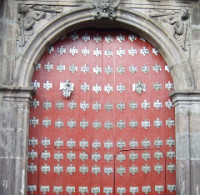I don’t particularly like this blog to swing into the personal, I have been told by a person wiser than myself that I should be a bit more forthcoming about where I am at and why. He is right. This blog exists mostly to toss my random ideas out there, but if any of them stick on anyone I would like them to get in touch. So here it is folks.
In the past month I have received my PhD in Archaeology at the University of Cambridge and I have moved to the Scottish Centre for Crime and Justice Research at the University of Glasgow. I am now working with Simon Mackenzie, Neil Brodie, and Suzie Thomas on that well-funded Illicit Antiquities/Criminal Networks project that people have been buzzing about.I’ve been awarded a Leverhulme Early Career Fellowship and a Core Fulbright Scholar Award to do this. Geographically, I will be focusing on Latin America with a bit of a weight on Andean South America (although I have been thinking a lot about Panama and Costa Rica and love Belize with all my heart). Everything is in the earliest of stages for me, but my work is set to focus on the trickle down of national and international antiquities protection law to communities who actually come in contact with and, at times, manage, the ancient past.http://traffickingculture.org/research/latin-american-antiquities/
A strong strain in all of this will be looking at comparative criminal markets/networks: what else is going on in these areas, how are those networks related or different, how are the perceived, how are they regulated (or not regulated) mostly just to see if anything is there. Sure, yes, in this part of the globe the obvious criminal network is cocaine. I see this as an interesting possibility as in Bolivia, coca production and consumption is tied up in deep cultural memories and very modern displays of political/social/cultural identity. But beyond this, my mind comes back to sorts of, how should I say it, institutionally/professionally sanctioned illicit markets and networks. Biological samples from living Amazonian groups? Medical/botanical Indigenous knowledge that wiggles its way into proprietary western pharmaceuticals? I have a lot of ideas. I’m still working them out.
 Fieldwork is going to happen and it will be in Bolivia first. I am currently looking for some sort of NGO to be my host institution without much luck, mostly because I need to move away from being associated with just archaeology and archaeologists. I don’t think the host institution needs to do much to “host” me: I come with my own money and a book grant for the institution through the Fulbright, but sorting it out is new to me. Although I am open to suggestions, I think if I have to do initial fieldwork quite soon (sorting out the timeline), Copacabana might be the right place. A largely Indigenous community that manages major tourist archaeological sites but also might have thoughts on trans-lake movement of illicit/illegal goods (aha, you say, alternative criminal networks!). Also I have been to Copacabana. It seems doable. Email me with ideas folks!
Fieldwork is going to happen and it will be in Bolivia first. I am currently looking for some sort of NGO to be my host institution without much luck, mostly because I need to move away from being associated with just archaeology and archaeologists. I don’t think the host institution needs to do much to “host” me: I come with my own money and a book grant for the institution through the Fulbright, but sorting it out is new to me. Although I am open to suggestions, I think if I have to do initial fieldwork quite soon (sorting out the timeline), Copacabana might be the right place. A largely Indigenous community that manages major tourist archaeological sites but also might have thoughts on trans-lake movement of illicit/illegal goods (aha, you say, alternative criminal networks!). Also I have been to Copacabana. It seems doable. Email me with ideas folks!
More broadly, the project will have a website quite soon (Edit: See the Trafficking Culture website) and you will be able to find out more there. Until then I am very eager to get in touch with people who have ideas and opinions about all this. I know that there will, no doubt, be backlash from certain sectors but I sincerely hope that the various interest groups can come together on this one. I’m really interested in hearing from dealers and collectors, even if my work probably won’t come very close to you all very often. As valid stakeholders in all this, your ideas and opinions matter. I suppose what I am saying is that I am not in this to pick fights, rather I am here to learn.
Hopefully this will be exciting and great. The people I am working with are truly amazing (and quite a lot of fun) and I can’t imagine where I would rather be.

